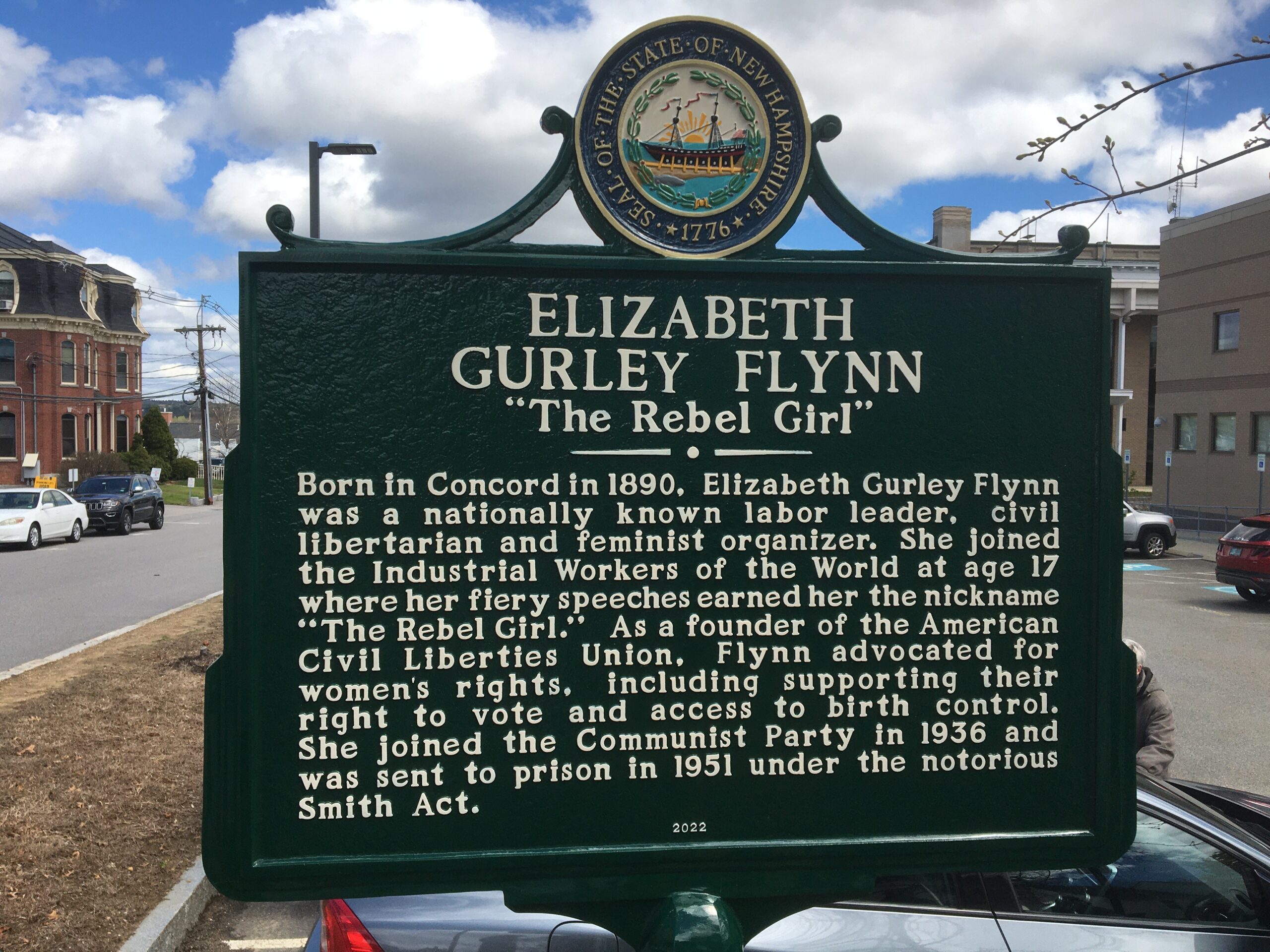The historic marker in Concord commemorating unrepentant Communist Elizabeth Gurley Flynn got sent to the ash heap of history as the Sununu administration finally stepped up and removed it from state property.
Now the progressive activists who pushed for the marker are complaining about its removal.
The New Hampshire Historical Highway Marker was unveiled on May 1 (May Day). It celebrated Concord-born Gurley Flynn as an early labor activist, a civil rights pioneer, a supporter of women’s access to birth control, and the former head of the Communist Party in America (CPUSA).
Gov. Chris Sununu first promised to get the marker removed after learning about it from irate executive councilors Joe Kenney (R-District 1) and Dave Wheeler (R-District 5) during a Governor’s Council meeting two days later.
“This is a devout communist. We are the ‘Live Free or Die’ state,” Kenney said. “How can we possibly promote her propaganda, which still exists now through this sign in downtown Concord?”
Sununu, however, did not immediately take the marker down. Instead, he and his administration blamed Concord city officials for the marker’s placement.
“Why Concord would want to put this in the first place, God knows,” Sununu said on Good Morning NH with Jack Health. “Just tell us to take it down we’ll take it down. I’d love to take it down.”
However, Concord City Attorney James Kennedy responded, making it clear in a letter to Department of Cultural and Natural Resources Commissioner Sarah Stewart that the state could do whatever it wanted with the marker it installed.
“To the extent that the State seeks removal of (the Flynn marker) a marker that it approved (title and text) created and installed, bearing the State seal and located on State property, the City takes no position on this issue,” Kennedy wrote.
On Monday, the Gurley Flynn monument was gone.
“Through their public statements, the City of Concord made clear they were not advocating to keep the marker up,” Ben Vihstadt, Sununu’s spokesman, said Monday. “In their communications with the state, it was learned that the marker was located on state property, not city property as previously believed, and therefore the marker was removed this morning.”
Far-left supporters of the marker and Flynn’s legacy cried foul.
“The policies of the Division of Historical Resources specify the conditions under which markers can be retired,” said Arnie Alpert, who, with Mary Lee Sargent, initiated the proposal for the Flynn marker. “Even under the policy’s latest revision, there is no provision for markers to be retired because of objections to their content.”
The pair continue to defend the marker saying Flynn is a historically significant person born in New Hampshire and should be recognized. “We still say that under the department’s own guidelines, Elizabeth Gurley Flynn’s birthplace in Concord is a fitting location for a historical marker,” Sargent said.
Flynn was an outspoken member of the American left who helped found the American Civil Liberties Union, which she was later kicked out of because she chose to join the Communist Party. In fact, Flynn joined in 1936, during the infamous purges under Soviet leader Josef Stalin that drove many other Westerners out of the party.
Flynn made no apologies for her Communism. In a May 6, 1940 speech, Flynn praised the USSR.
“On May Day, we salute the Soviet Union, land of socialism, land of peace and plenty, the great ideal of labor since time immemorial, the cooperative commonwealth of all who toil,” Flynn said.
Flynn was convicted in 1951 for fomenting the overthrow of the United States, later became head of the Communist Party USA, and was given a state funeral in Moscow’s Red Square by a grateful Soviet Union when she died in 1964.
Alpert and Sargent continue to insist the marker should have remained and that Sununu lacked the authority to remove it as he did. They say that, under the state’s guidelines, markers are only removed if they are in disrepair or contain text with factual errors. The state also requires a public hearing before any marker is removed.
“None of the conditions for the marker’s removal have been met,” Alpert said.
Vihstadt, however, said the state acted correctly in taking down the sign.
“All policies and guidelines were followed in removing this controversial marker,” Vihstadt said.

